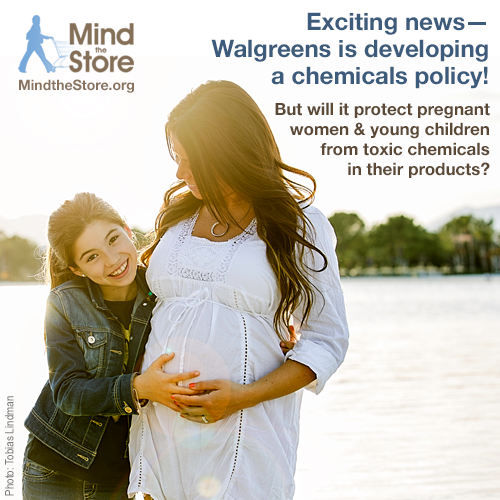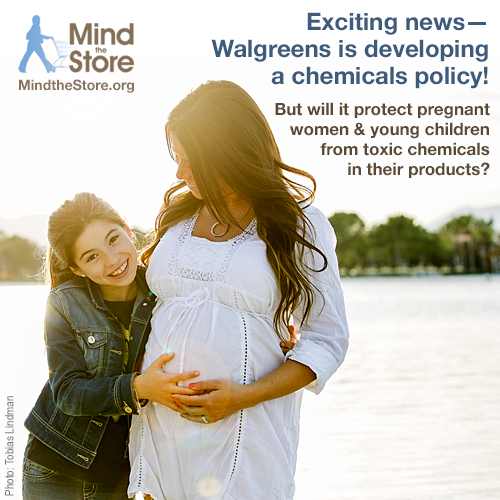Since we launched the Mind the Store campaign nearly two years ago, we’ve been calling on the nation’s biggest retailers to get serious about toxic chemicals in their products. Last year we challenged Walgreens, the nation’s #1 pharmacy chain, to adopt a comprehensive chemicals policy.
Guess what? They are listening to our calls!
After over a year of reaching out to the company and 135,000+ emails, Walgreens finally responded and announced they are developing a chemicals policy. They said they are making this a priority and should be announcing a policy this spring.
Parents Speak Out for Safer Products
The Mind the Store campaign first wrote to Walgreens in April 2013 encouraging them to take action on the Hazardous 100+ chemicals. After a year of no response, in April 2014 a broad coalition of health and environmental organizations held a national day of action at Walgreens stores in over 20 states, followed by a week of action in July. Read all about it over at GreenBiz.
Last year, HealthyStuff.org tested dozens of products Walgreens sells, including household cleaners, school supplies, pet toys and other categories. Many were found to have one or more hazardous chemicals including PVC plastic, phthalates, organotins, flame retardants and heavy metals, which have been linked to asthma, learning disabilities, reproductive problems, and cancer.
These actions played a big role in Walgreens coming to the table to meet with us, and in December they publicly shared for the first time to prioritizing this issue and developing a Sustainable Chemistry Program. Walgreens announced they:
“recently initiated organizational changes that identify this as a key component of our company’s broader corporate social responsibility program. We are in the process of developing a Chemical Sustainability Program, which we anticipate announcing in the spring of 2015. We are leveraging the expertise that our colleagues at U.K. retailer Boots can provide as pioneers in retailing, manufacturing and chemical sustainability.” (emphasis added)
We congratulate Walgreens for taking these first steps.
Walgreens: Time to Spring Into Action
Now we would like them to finish the job, and make sure their policy is as comprehensive as health protective as possible.
As spring has approached over the past month, health and environmental advocates in Massachusetts, Connecticut and Maryland delivered over 135,000 petitions to Walgreens signed by their customers from across the country, calling on Walgreens to spring into action and adopt a comprehensive policy to phase out toxic chemicals in products like cosmetics, children’s and cleaning products.
Be sure to check out photos from some of the events, and this article and TV story from Baltimore this week.
What Does a Comprehensive Policy Look Like?
As one of the nation’s top ten retailers and the largest pharmacy chain nationwide, Walgreens can help lead the way.
In December Walgreens went through with their merger with Boots, and we are pleased the company has stated they will be able to leverage Boots’ expertise. If Boots can do it in Europe, Walgreens can in the US too!
Other retailers like Target and Walmart have adopted comprehensive approaches, and Walgreens should evaluate those as they go down this journey.
Just last week, the presidents of the Learning Disabilities Association of America, the Arc, Autism Society and National Down Syndrome Society, along with many LDA state affiliate offices sent the company a letter sharing their perspectives on what they think a policy should look like.
As the LDA’s pointed out, there are some useful frameworks that Walgreens’ Chemical Sustainability Program should be aligned with, such as the BizNGO Principles for Safer Chemicals and the Five Essential Practices for Retailers, Brand Owners and Suppliers.
At its core, we think a comprehensive approach by Walgreens should be aligned with those principles and include these essential elements:
- Disclosure of toxic chemicals (including in fragrances) in private label and brand name products to Walgreens and customers, especially for cosmetics, cleaning products, and other products for infants, children and women of childbearing age;
- Development of a comprehensive Restricted Substance List (RSL) for chemicals in private label and brand name products, especially for cosmetics, cleaning products, and other products for infants, children and women of childbearing age;
- Encouraging suppliers to reduce, phase out and eliminate chemicals of high concern in private label and brand name products;
- Avoiding “regrettable substitutes”, to ensure that suppliers don’t transition from one dangerous chemical to another; and
- Publicly reporting on benchmarks and a timeframe for implementing their policy.
We are hopeful.
We are hopeful that Walgreens will develop a strong chemicals policy that is meaningful and will promote greater disclosure of, avoidance and safer substitution of hazardous chemicals in the products they sell.
As a company dedicated to health and wellness, Walgreens has a unique responsibility to ensure their products don’t contain toxic chemicals. In the months to come, we will be paying close attention to the chemicals policy Walgreens develops and announces.
We are hopeful Walgreens will do what’s right for our families.






